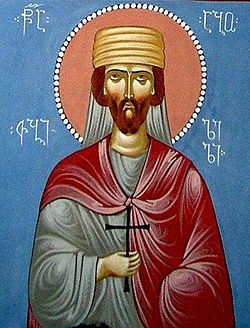History
- Section contains alphabetical listing of converts from earlier times until the end of the 19th century
A

- Abo of Tiflis – Christian activist and the patron saint of the city of Tbilisi, Georgia [40]
- Abraham of Bulgaria – martyr and saint of the Russian Orthodox Church [41]
- St. Adolphus – martyr who was put to death along with his brother, John, by Abd ar-Rahman II, the Caliph of Córdoba, for apostasy [42]
- Jabalah ibn al-Aiham – last ruler of the Ghassanid state in Syria and Jordan in the 7th century AD; after the Islamic conquest of Levant he converted to Islam in AD 638; later reverted to Christianity and lived in Anatolia until he died in AD 645 [43]
- Leo Africanus – Moorish diplomat who was converted to Christianity following his capture. [44] [45]
- Ahmet the Calligrapher – an Ottoman Turkish official martyred in 1682 by Mehmed IV
- Safdar Ali – former Maulvi (cleric) from India [46]
- Saint Hodja Amiris – former Ottoman soldier stationed in Jerusalem who converted to Christianity in the 17th century and was subsequently tortured and killed for the crime of apostasy in Islam [47]
- Avraamy Aslanbegov – Russian-Azeri vice-admiral and military writer of the Russian Empire, converted to Eastern Orthodox Christianity [48]
- Aurelius and Natalia – martyrs who were put to death during the reign of Abd ar-Rahman II, Caliph of Córdoba for apostasy [49]
- Anemas – Son of the last Emir of Crete Abd al-Aziz ibn Shu'ayb. He converted to Christianity and joined the Byzantine army as a member of the imperial bodyguard.
B
- Sarah Balabagan – Filipino former migrant worker imprisoned for murder in the United Arab Emirates. [50]
- Simeon Bekbulatovich – Khan of Qasim Khanate [51]
- Alexander Bekovich–Cherkassky-Russian officer of Circassian origin who led the first Russian military expedition into Central Asia [52]
- Sayed Borhan Khan – Khan of Qasim Khanate from 1627 to 1679; [51] was forced to convert to Christianity by Russian forces following the Siege of Kazan [51] [53]
- Bulus ibn Raja' – converted to the Coptic Orthodox Church and wrote the Kitab al-wadih bi-l-haqq (c. 1010), a critique of Islam [54]
C

- Constantine the African – Baghdad -educated Muslim who died in 1087 as a Christian monk at Monte Cassino [55] [56]
- Converso – substantial numbers of Iberian Muslims who converted to Catholicism in Spain or Portugal, particularly during the 14th and 15th centuries. These New Christians of Moorish Berber origin were known as Moriscos. Over 1 million of these Moriscos were converted from Islam to Christianity, many of them by force, [57] [58] but many also became sincere and devout believers in public. [59]
E
- Eleni of Ethiopia – Empress of Ethiopia, forcibly married and converted to Christianity by Kewstantinos I after his invasion of Hadiya.
- Estevanico – Berber originally from Morocco and one of the early explorers of the Southwestern United States [60]
G
- George XI of Kartli – Georgian monarch who ruled Eastern Georgia from 1676 to 1688 and again from 1703 to 1709; an Eastern Orthodox Christian, he converted to Islam prior to his appointment as governor of Qandahar; later converted to Roman Catholicism [61]
- George of Hungary (c. 1422-1502) [62] – Ottoman slave that escaped and reverted back from Islam to Christianity.
H
- Umar ibn Hafsun – leader of anti-Ummayad dynasty forces in southern Iberia; converted to Christianity with his sons and ruled over several mountain valleys for nearly forty years, having the castle Bobastro as his residence [63]
J
- Don Juan of Persia (1560-1604) – late 16th-and early 17th-century figure in Iran and Spain; also known as Faisal Nazary; was a native of Iran, who later moved westward; settled in Spain where he became a Roman Catholic [64]
- Jesse of Kakheti – Georgian prince of the Bagrationi dynasty, son of King Leon of Kakheti converted to Islam in the Service of the Safavid dynasty, but returned to Orthodox Christianity after his return to Georgia [65]
- Jesse of Kartli – Georgian prince of the Bagrationi dynasty (from Christianity to Islam back to Christianity) [66]
K
- Alexander Kazembek – Russian Orientalist, historian and philologist of Azeri origin [67]
L

- Imad ud-din Lahiz – prolific Islamic writer, preacher and Qur'anic translator [68]

M
- Sake Dean Mahomed (born Sheikh Din Muhammad) – Indian traveller, surgeon and entrepreneur who introduced the Indian take-away curry house restaurant in Britain; first Indian to have written a book in the English language; [70] [71] converted to marry Jane Daly, an Irish Protestant, as it was illegal for a non-Protestant to marry a Protestant. Later became a devout follower. [69]
- Enrique de Malaca – Malay slave of Ferdinand Magellan, converted to Roman Catholicism after being purchased in 1511 [72] [73] *some source said he was never converted to Christianity
- Abdul Masih – Indian indigenous missionary; ordained Anglican and Lutheran minister; [74] [75] often referred to as the most influential indigenous Christian to shape nineteenth-century Christian missions in India; religious author
- Ahmed ibn Merwan – Seljek Turk lieutenant during the First Crusade. He converted to Christianity sometime after surrendering Antioch to the Crusaders.
- Mizse – last Palatine of King Ladislaus IV of Hungary in 1290; born into a Muslim family in Tolna County in the Kingdom of Hungary; converted to Roman Catholicism [76]
- St. George El Mozahem – Coptic saint [77] [78] [79]
N
- Aurelius and Natalia (died 852) – Christian martyrs who were put to death during the reign of Abd ar-Rahman II, Emir of Córdoba, and are counted among the Martyrs of Córdoba; Aurelius was the son of a Muslim father and a Christian mother. He was also secretly a follower of Christianity, as was his wife Natalia, who was also the child of a Muslim father. [80]
- Ibrahim Njoya – Bamum king; back and forth conversions from Islam to Christianity [81]
- Nunilo and Alodia – 9th-century sisters recognized as Catholic saints and martyrs in Moorish Spain, executed for apostasy for converting to Christianity
Q
- Qays al-Ghassani – a Christian Arab of the 10th century, from Najran, southern Arabia. He converted to Islam in his youth. He later reverted to Christianity and became a monk. He was tried at Ramla for apostasy but refused to return to Islam and was beheaded. [82]
R
- Ștefan Răzvan – Gypsy prince who ruled Moldavia for six months in 1595 [83]
- Emily Ruete – Zanzibari princess born as Salama bint Said [84]
S

- Omar ibn Said – writer and scholar of Islam, enslaved and deported from present-day Senegal to the United States in 1807, formally converted to Christianity in 1820, though appears to have remained at least partially Muslim.
- Begum Samru – powerful lady of north India, ruling a large area from Sardhana, Uttar Pradesh [85]
- The Sibirsky family – foremost of many Genghisid (Shaybanid) noble families formerly living in Russia [86] [87]
- Shihab family or alternatively Chehab family – prominent Lebanese noble family; having converted from Sunni Islam, the religion of his predecessors, to Christianity at the end of the 18th century. Descendants were Maronite rulers of the Emirate of Mount Lebanon [88] [89] [90] [91]
- Bashir Shihab II – Lebanese emir (prince) who ruled Ottoman Lebanon in the first half of the 19th century; his family was Sunni Muslim; some of them converted to Maronite Catholic Christianity at the end of the 18th century [92] [93] [94] [95]
- Skanderbeg – Albanian military leader; was forcibly converted to Islam from Christianity, but reverted to Christianity later in life [96]
- Maria Aurora von Spiegel (born Fatima) – Turkish mistress of Augustus II the Strong and the wife of a Polish noble [97]
T
- Tabaraji of Ternate – Indonesian sultan; converted to Roman Catholicism after 1534 and baptised with the name Dom Manuel [98] [99]
- Casilda of Toledo – daughter of a Muslim king of Toledo (called Almacrin or Almamun); became ill as a young woman and traveled to northern Iberia to partake of the healing waters of the shrine of San Vicente; when she was cured, she was baptized at Burgos; venerated as a saint of the Catholic Church [100]
U
- Ubayd-Allah ibn Jahsh (Arabic: عبيد الله بن جحش) – brother of Zaynab bint Jahsh, brother in law and first cousin of Muhammad and one of the male Sahaba (companions of the Prophet); [101] he has been cited as one of the four monotheistic hanifs by Ibn Ishaq who converted to Christianity after his migration to Abyssinia [102]
- Utameshgaray of Kazan – Khan of Kazan Khanate; [51] was forced to convert to Christianity following the Siege of Kazan [51]
X
- Muley Xeque (Arabic: مولاي الشيخ Mawlay al-Shaykh) – Moroccan prince, born in Marrakech in 1566; exiled in Spain, he converted to Roman Catholicism in Madrid and was known as Philip of Africa or Philip of Austria [103]
Y
- Yadegar Moxammat of Kazan – last khan of Kazan Khanate [51]
Z
- Zaida of Seville – born an Iberian Muslim; when Seville fell to the Almoravids, she fled to the protection of Alfonso VI of Castile, becoming his mistress, converting to Christianity and taking the baptismal name of Isabel [104]
- Zayd Abu Zayd – the last Almohad governor of Valencia, Spain; remained a loyal ally of James I; in 1236 he converted to Roman Catholicism, adopting the name of Vicente Bellvis, a fact which he kept secret until the fall of Valencia [105]
- Abu'l-Maghra ibn Musa ibn Zurara – last Zurarid emir of Arzen





